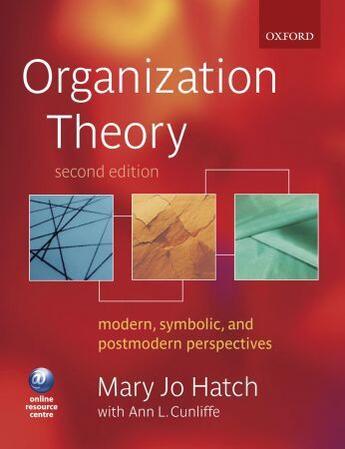-
Date de parution : 16/09/2010
-
Editeur :
Oxford Up Elt
-
EAN : 9780199260218
-
Série :
(-)
-
Support :
Papier
Résumé:
Comprehensive coverage of the most relevant topics in the field of organization theory provides a thorough grounding that will immerse students in the subject.
Only textbook to explain core concepts from the three dominant perspectives on organization theory, providing a distinctive approach... Voir plus
Comprehensive coverage of the most relevant topics in the field of organization theory provides a thorough grounding that will immerse students in the subject.
Only textbook to explain core concepts from the three dominant perspectives on organization theory, providing a distinctive approach that encourages thought and discussion.
Unique writing style makes complex ideas accessible and engaging.
Numerous figures and tables help explain theories, make them more memorable, and serve as reference tools for quick review.
New to this edition Contains new chapters on practical applications of organization theory and on new perspectives in organization theory.
A largely revised chapter on power, politics, control and conflict now appears in Part II: The Core Concepts of Organization Theory.
Includes major revisions to all chapters updating and extending modern symbolic-interpretive and postmodern perspectives.
A companion web site contains resource material for both students and instructors, the latter of which will be password-protected, including web links, discussion questions, and teaching suggestions.
Organization Theory offers a clear and comprehensive introduction to the study of organizations and organizing processes. It encourages an even-handed appreciation of the different perspectives contributing to our knowledge of organizations and challenges readers to broaden their intellectual reach.
Organization Theory is in three parts:
Part I introduces the multi-perspective approach.
Part II presents many ways in which organizations can be analyzed - as entities within an environment, as social structures, technologies, cultures and physical structures, and as the products of power and political processes.
Part III explores applications of organization theory to the practical matters of organizational design and change, and introduces the latest perspectives on the horizons of organization theory, including complex adaptive systems, organizational identity theory, critical realism, network theory, aesthetics, and organizational learning.
Online Resource Centre For lecturers: PowerPoint slides, exam questions, teachig suggestions, a discussion forum, case studies and exercises with instructor's notes.
For Students: annotated web links, and discussion questions.
Readership: This text is appropriate for second and third-year undergraduates and Master's level students on business, management and public administration courses as well as Ph.D students in the field of organization studies and organizational communication.
Donner votre avis














